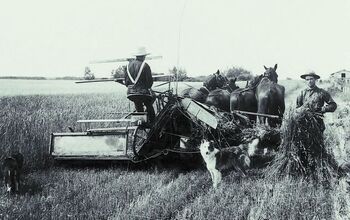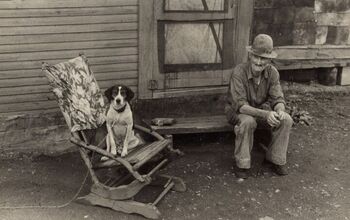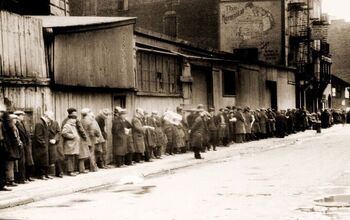37 Brilliant Frugal Living Tips From the Great Depression

This post may contain affiliate links which means that I may receive compensation at no extra cost to you if you make a purchase from a link found on my site. Please review my privacy policy for further details. As an Amazon associate, I earn from qualifying purchases. Thank you for your support in allowing this site to continue!
These frugal living tips from the Great Depression are timeless ways to help families save money almost 100 years later!
The difficult days in the early 1900s were a time in history that forced many Americans to become enormously creative with the resources they had at their disposal. There was no room for waste. Everything had be used and reused to the highest degree.
As a result of extreme conditions, people during the Great Depression developed a new perspective on life. They focused on the essentials, got back to basics, and made the most out of what they had. They developed a frugal mindset as well as skillsets that were truly invaluable.
Though most of us don’t live in extreme poverty, we can nevertheless benefit from learning from that incredibly resilient generation. These frugal living tips from the Great Depression era emerged from financially difficult times and have stood the test of time. Applying them will help reduce your expenses and promote a healthy money mindset.
37 Brilliant Frugal Living Tips from the Great Depression
1. Stop eating out.
Eating in restaurants is usually far more expensive than eating at home. Learning to cook is essential to frugal living. Unlike during the Great Depression, there is a wealth of budget recipes and eating on the cheap at your fingertips thanks to the world wide web.
2. Live within your means.
It’s crucial to know how much you earn and spend on a weekly and monthly basis. Getting a handle on your expenses in comparison to your income is key. No matter if you make $20,000, $200,000, or even $2,000,000 a year, if you spend more than you make, you’ll continue being broke.
3. Learn how to sew.
Past generations valued taking care of the items they owned. Sewing is a simple yet powerful skill that helps extend the life of your clothes. Even just basic sewing skills such as stitching up a hole can help you get the most out of every garment you own.
4. Eat less meat.
Meat is a primary meal ingredient for many people but it can be expensive. Instead, build recipes around vegetables, beans, and grains. If you make meat part of the supporting cast rather than the star of the show, you’ll save money on meals.
5. Don’t ignore routine maintenance.
When money is tight, there is a tendency to stop all spending that isn’t absolutely necessary. That’s not bad in and of itself. But don’t neglect routine maintenance on things like your car or A/C unit. Failing to maintain these things may save money in the short run but will lead to spending more in the long run with the increased risk of breakdown and the need for repair.
6. Start a garden.
Growing your own food is a timeless frugal living tip from the Great Depression era that many people still love today! If you have available space for gardening, you can grow enough food for your family and then some. Even if space is limited, there are creative space-saving tricks to grow a garden in pots, jars, and planters. You may even want to consider the Square Foot Gardening method. It’s ideal for producing high yields in small spaces.
7. Eat snout to tail.
In modern times, we’ve learned to eat rather high on the hog. We’ve gotten used to eating premium cuts of meat and discarding the rest. But when discussing important frugal living tips from the Great Depression era, you can’t go without mentioning eating snout to tail! Which means to maximize everything you can from the animal for future meals, even the less desirable parts.
For example, let’s talk about chicken. Instead of just using the chicken breast, you can use the darker meat for stews and casseroles. Then lastly, boil the bones to create a nourishing bone broth.
8. Make it, don’t buy.
Making your own food and growing your own produce is a start. Then branch out by thinking about the things that you buy on a regular basis!
For example, it’s a major cost saver to make your own homemade cleaning and personal care products once you learn how to do them! Think of how much money you will save over time without needing to buy these pricey items on a recurring basis by making your own for a fraction of the cost.
9. Cook from scratch.
Avoid convenience foods and pre-made food items. Learn to make things like bread, cakes, cookies, and pasta from scratch. They taste better, have no preservatives, and are far more economical. Plus, they’re a lot easier to make than you probably think!
10. Start canning your food.
If you try gardening, you may find that you have way more produce than you need. Apart from giving it away to others, make the most of your harvest by canning it! We recommend this highly recommended book, Ball Complete Book of Home Preserving, to get you started.
11. Forage for food.
Did you know that you can eat a lot of what naturally grows outside for free? There could be nutrient rich foods right outside your door, such as nuts, mushrooms, and berries. For more information, grab a book on foraging in your particular region.
12. Save your food scraps.
Even if you significantly reduce waste, you’ll still have to throw away some things. But, don’t toss out food scraps like vegetable and fruit peelings! For example, vegetable scraps like onion tops can be used to season homemade stock. Fruit peelings like orange and lemon can be candied. Veggie scraps can also be added to your compost pile which, in turn, can be used for your home garden.
13. Use everything to the last drop.
One of the most essential frugal living tips from the Great Depression is learning to use it all up! We can all benefit from taking that sentiment to heart. Squeeze out that last bit of toothpaste and turn up condiment bottles to get the last drop. It may not seem like you’re doing much, but every little bit counts!
14. Lend, borrow, and barter.
Rather than spending money on things you need, get used to lending, borrowing, and bartering. Chances are, you have something that someone else needs and vice versa. Trading or lending is a great way to get access to what you need without having to pay out of pocket.
15. Buy used items.
There are some things that are perhaps better purchased new. But, most anything that you can think of that can be bought new can be purchased used at a fraction of the price. Just make sure that you take quality into consideration. There’s no sense in buying a secondhand item that will require a lot of maintenance or one that costs more to fix it up than if you were to buy it new.
16. Repurpose old items.
Don’t simply throw away things that you no longer need. Instead, find a new use for them. A bit of paint can turn an old frame into an attractive piece of décor, old jars can become herb planters, and more. The sky’s the limit with repurposing items to save money!
17. Buy classic clothing.
An important money saving tip is to avoid fashion fads. Trying to keep up with the latest trends is very expensive. Rather than buying the latest and greatest in fashion, opt for classic tops, bottoms, and dresses that can be mixed and matched in various ways and can be worn for years without looking dated.
18. Line dry clothing.
Line drying your clothes is an old fashioned method with a few great benefits. First, you don’t run the electric dryer which saves money on utilities. Second, line drying will extend the life of your garments!
19. Wash clothing less often.
Washing your clothes is necessary but it also breaks down the quality of the materials over time and can dull the colors. Washing less often will extend the life of your clothing in the long run.
20. Wash clothing by hand.
Similar to line drying, washing clothes by hand saves money on utilities. And, washing clothes by hand, helps to preserve their integrity, maintain their color, which makes them last much longer.
21. Avoid credit cards.
Yes, of course, credit cards were not around during the Great Depression. That’s the point! Living within your means will safeguard you from spending more than what you make. Avoiding credit cards is one of the best ways to protect your hard earned dollars from being spent before you’ve earned them. Follow a simple rule, “If I don’t have it, I won’t spend it!”
22. Bundle up.
During the winter months, bundle up. Instead of constantly running the electric heater or furnace to stay warm, wear a few more layers of clothes and pile on the blankets. It’s a simple yet effective way to reduce energy costs during the colder months of the year.
23. Work odd jobs.
In addition to your regular job, pick up odd jobs when you can. Rake leaves, haul off trash, or clean someone’s pool. The cash earned from those odd jobs can really add up! Check out our article on Ways to Make Money FAST for inspiration.
24. Make your own gifts.
Giving gifts is an important social ritual. It can, however, become very expensive over time. Instead, consider making gifts rather than buying them. Homemade gifts are not only usually cheaper but they’re also infinitely more personal.
25. Don’t pay for what you can do yourself.
Those who were alive during the Great Depression learned the art of self-reliance. As a result, many developed a simple rule: don’t pay someone to do something you can do yourself. Things like changing the oil on your car and mowing your own lawn, build a sense of pride in what you own as well as saving you money!
26. Avoid disposable products.
Ditch disposable products! Switching from plastic cups to a reusable water bottle or using cloth napkins instead of paper is a great way to get off the treadmill of disposable products to save money and reduce waste.
27. Use home remedies.
Healthcare can be rather expensive! Consider using tried and tested home remedies for aches pains and the common cold. One of our favorite ways to stay healthy during cold and flu season is by making our own Elderberry Syrup.
28. Bake in batches.
Save money on food by being intentional with your time and resources! Set aside one day or a half a day for meal preppping. Baking in batches is an effective frugal living tip from the Great Depression era that is still a time and money saving hack today!
29. Save your grease.
Saving your bacon grease and other drippings is an invaluable cooking tip from the Great Depression era. First off, you can use it to keep your cast iron skillets seasoned. In addition, you can use it to add a punch of flavor to soups, stews, roasts, beans, and more.
30. Drive less.
During the Great Depression, alternative forms of transportation were used over the automobile to save money. With gas prices being variable each day, learn to rely on other methods of transportation. If you can, think about ways to bike, walk, or carpool to your destination. You’ll save a little bit of money and add some additional physical activity into your daily routine.
31. Use manual tools.
There are times when a gas powered weed-eater or electric drill is preferable. But there are plenty of times where a manual version would work just fine as well. Use manual tools when you can to reduce the need for electricity or gas to cut costs.
32. Get involved in your community.
The people who came out of the Great Depression learned self-reliance and creativity. That doesn’t mean that they didn’t also lean heavily on their neighbors and community too. Get connected with your local community and meet your neighbors. It’s the best way to take advantage of sharing resources and living a more rewarding life.
33. Find free or cheap entertainment.
You don’t have to spend next month’s rent to get quality entertainment. In fact, you don’t even have to buy a movie ticket. There are plenty of free and cheap ways to keep the whole family entertained. Break out the board games, go outside for a game of catch, or checkout a DVD from your local library.
34. Be energy efficient.
Don’t speed needlessly to warm and cool your home. For colder months, be sure to winterize your house. Fill gaps under doors and around windows, let sunlight in, and wear layers. During the summer, create cross-breezes by opening windows, use fans, and wear light colors to stay cool and save money.
35. Buy quality when you can.
Sometimes you have to buy an item to fit the need and budget you have right now. If you can, think about the long term rather than the immediate need. Spending a little more out of pocket now and buying quality could mean saving money overall.
36. Be content with what you have.
An old Amish proverb says something to the effect of, “Every man is rich until he wants what he doesn’t have.” Learning to be content with what you have is a secret to smart money management. Not only will developing contentment lead to improved finances but it will also likely lead to a more fulfilling life.
37. Learn to do without.
The hardest thing to do is to say, “No” to buying something that you really want. If you’ve prioritized your purchases and have the things that you need, then learning to do without will help you get financially ahead, especially in hard times.
Thank you for taking the time to read through our list of 37 frugal living tips from the Great Depression. Even during a strong economy, these lessons learned from one of the most difficult eras in our history can teach us to value what we have and improve our money management.
If you have any Depression Era money saving tips you’d like to share, drop us a line in the comments section below. We’d love to hear from you!




























Comments
Join the conversation
We grew up on “scrap soup” and I still make it. Any left over veggies or protein would be added to a large container in the freezer. When the container got full, soup was made. It always came out different and always good.
When I was a child and ask my dad for something he would always say "Do you Need it or just want it? If you really need it we will find a way for you to get it, but if you just want it, you will not get it. At 78 I still hear that advise and follow it.